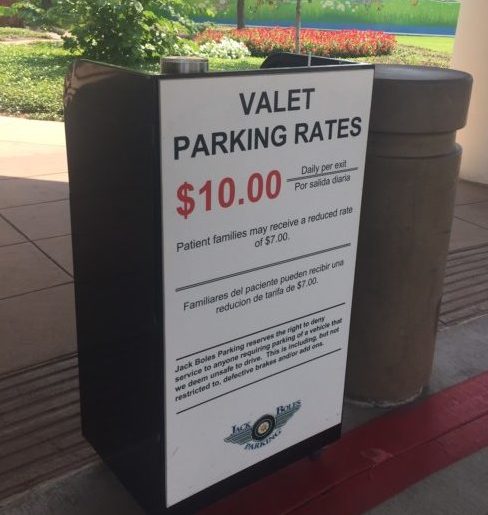
Over the past six years, my daughter has been to just about every type of specialist, has had multiple surgeries, and dozens of hospital visits. These are the strategies I’ve learned along the way to best deal with doctors, hospitals, and medical offices.
Whether your child is perfectly healthy, has developmental delays, or maybe is dealing with a chronic issue, I hope these some of these tips will help you be the absolute best advocate for his or her care.
1. Don’t hesitate to press “1” on the phone menu.
You know when you call a doctor’s office and get the automated voice that lists all the numbers to press to make an appointment, talk to a nurse, talk about insurance, etc. Well, if I have tried that route to get to a nurse and have not received a call back by the end of the day (or whenever is promised), I totally press 1. (Yes, the “if you are a doctor calling” line). I explain to the receptionist that it’s the end of the day and I haven’t heard back from anyone about my daughter’s issue. Usually, I am transferred immediately to a nurse.
2. Don’t be afraid to ask for cell phone numbers and emails
Why do so many doctors make us swim through so many channels to be able to talk to them? Okay, don’t answer that. But, gosh, if there is a serious medical concern at hand, I don’t hesitate to ask for the doctor’s phone number. Or if there is a non-serious but ongoing issue, I ask for the nurse practitioner’s email. It saves so much time than all those phone calls back and forth – half of which are missed, then you have to start over again. (If you’ve ever missed an important call from a doctor, you know the tears that ensue!)
Case in point: my daughter recently had surgery and had complications from anesthesia. I was a nervous wreck when we left the hospital, but the anesthesiologist at the hospital on call gave me his direct cell phone number to call or text him if something happened over the weekend. I seriously wanted to kiss him. It was like pure gold in my hands.

3. Everyone can’t be the best in his/her field.
When asking friends for recommendations for different specialists I heard again and again, “Oh, he’s the best xyz,” or “She’s the best ENT in town.” And oftentimes that wasn’t the case. We’ve received a lot of bad medical advice from some of “the best.” Just saying. Do your own research. It’s even okay to interview doctors – whether it’s a pediatrician or a neurosurgeon.
4. You can walk your child back to the OR.
If your child is having surgery or a procedure under anesthesia you will mostly be told you can’t walk with your child back to the OR. They will give you the option for “happy juice” (aka versed) to make the child loopy. My child doesn’t do well on versed so if she is feeling anxious I will ask the doctor (not the nurse) if it’s okay. And I have never had one doctor say no to me. They will get you all dressed up in scrubs and a cap and your child will think it’s hilarious.

5. Learn names.
The lady who works at the front desk, the person that deals with insurance. Having a good rapport with these people goes a long way. A little gift like cookies or a Starbucks gift card can move mountains. Trust me.
6. Take advantage of Child Life Specialists.
At most major hospitals these days there is an entire staff devoted to helping support the patients and their families. They can bring your child coloring books, stuffed animals, etc. If your child is feeling anxious, they may be able to offer words that really help. Just ask the nurse to give them a ring.
7. It’s okay to say no to residents.
I know I’m going to get some negative comments about this one from those in the medical community. Listen, I am all for hands-on learning, but having several bad experiences with residents I no longer feel guilty about saying “no” to them and asking for the attending doctor if I have a concern. Seeing that most prestigious children’s hospitals are also teaching hospitals this can be an issue that comes up again and again, especially if you’re staying overnight when residents are abundant and often eager to have hands-on experience. Whatever your stance, be sure to ask a lot of questions: who is actually performing the procedure, how much assistance will the resident or medical student give, who else will be in the OR?
8. Go with your instinct.
Moms hear this again and again, but it’s definitely true! We see our children more than the doctor or nurse who sees them for maybe 20 minutes once a year. If you feel like your concerns are being brushed off, find a new doctor. Trust me, your child’s doctor won’t be devastated by your departure. Or if you are at the hospital, and feel like something’s amiss, ask for for the charge nurse or attending doctor. Tell someone and keep telling them until someone listens.

9. Speak up.
If you’ve had a bad experience with someone in the medical community, take the time to tell his or her superiors. It might make a difference in another child’s care someday! If the front desk staff at your child’s pediatrics office is rude, tell the doctor. (He or she may not know!).
On the same token, if a nurse, medical assistant, or doctor goes above and beyond, tell his/her superior. Fill out the little comment card they give you at the hospital, leave a note for the office manager, or maybe even write a thank you note after the fact. Good care needs to be encouraged and rewarded at all levels.

10. Treat yourself; use the valet.
Ha! Bet you didn’t expect this one, but momma’s sanity counts for something when dealing with doctors and hospitals. I lugged my stroller, my baby’s oxygen tank, and my three-year-old across the Children’s Hospital sky bridge several times before I said “enough.” I decided that as long as my daughter was going to be a frequent visitor, I was treating myself to valet parking. After all regular parking is about $4 and valet parking is $10.
It was totally worth the six dollars! They helped me load all my stuff in and out of the car, were kind to my children, and oh my gosh how nice was it after a 3-hour long appointment to have my car ready out front for me. If your child is having surgery, or has a long appointment, valet parking might be worth it for you, too.
Please share your tips below!













